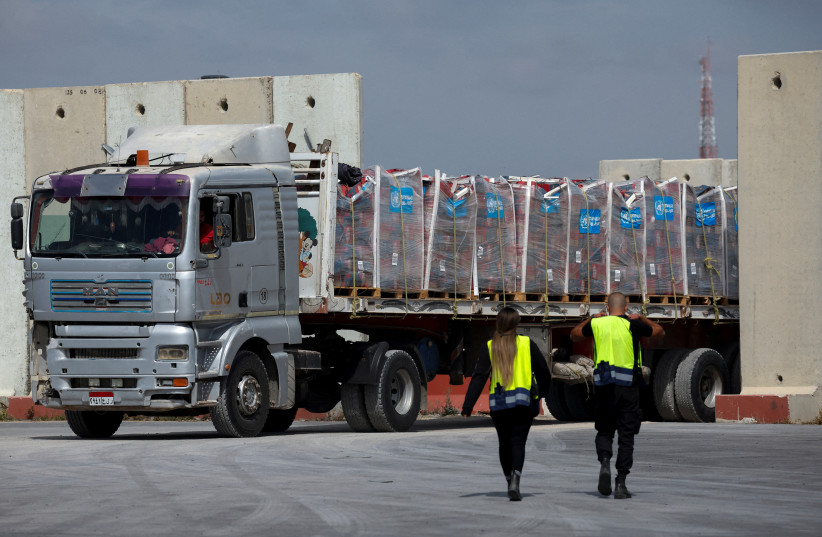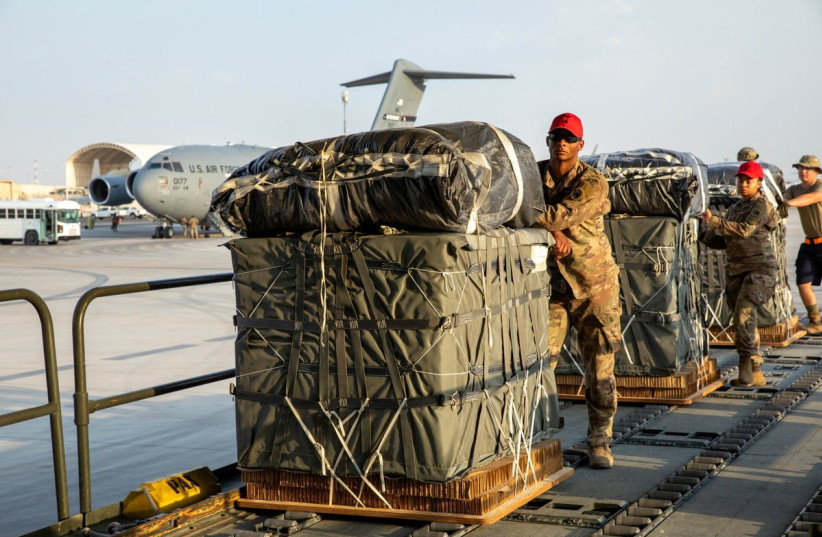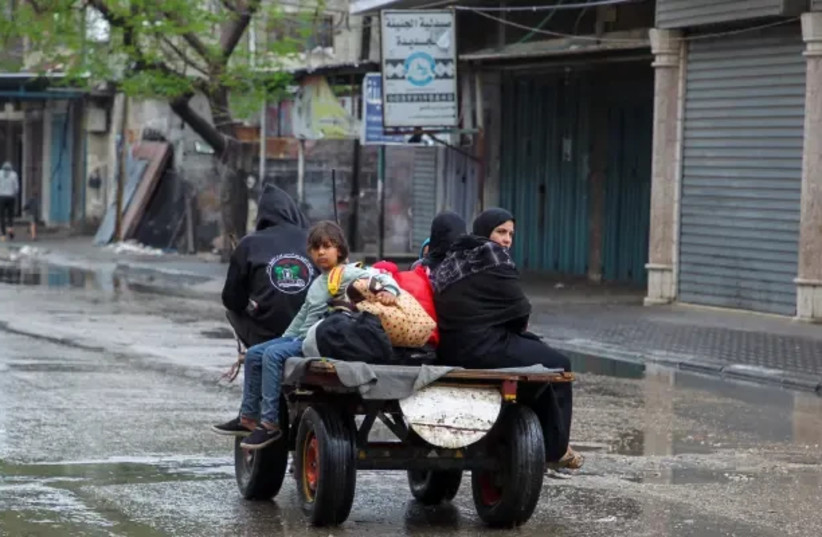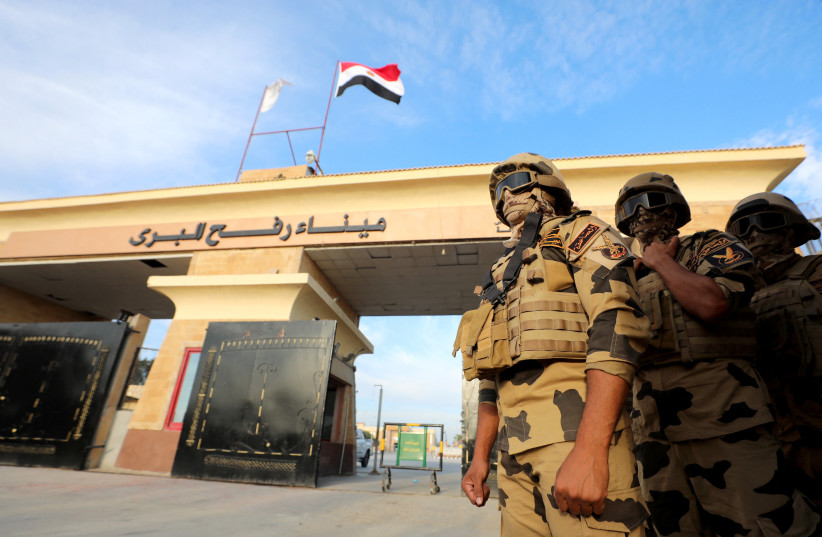Humanitarian aid cannot be used as a bargaining chip in Gaza, veteran US diplomat David Satterfield said in an interview with The Jerusalem Post.
Satterfield, the immediate former US special envoy for Middle East humanitarian issues, went on to equate using humanitarian aid as a bargaining chip to holding the millions of civilians living in Gaza as hostages.
"You cannot hold 2.2 million innocent civilians hostage who are living in desperate condition in every aspect of life—shelter, sanitation, food, medical care—by depriving them of even the the most basic of needs," Satterfield declared, underscoring the urgent moral and strategic necessity of providing aid to the beleaguered population.
Since leaving his government post, Satterfield has returned to his position as Rice University's James A. Baker III Institute for Public Policy director. As such, he is now free to talk about the last eight months of the Israel-Hamas War: What conversations have been happening behind the scenes, what caused the Israeli government to allow humanitarian aid into Gaza, and the many crises surrounding the Rafah operations.
A lot of Israelis say that while the US pressured Israel into entering humanitarian aid into Gaza, the US hasn't done so in its many military operations around the world.
That is flat-out wrong. Even in the most complex campaigns in which the US has been involved, we have undertaken all possible efforts—in Iraq, Mosul, and Fallujah—to provide for the humanitarian needs of affected populations.

Now, the argument can be made correctly that Gaza presents even more complicated and challenging circumstances than anything in Iraq. That's correct. I don't challenge that at all.
But that makes it all the more critical that maximum efforts be made because the complexity of the campaign and its objectives require it as a strategic matter. And [the IDF's goals] regarding Hamas's ability to govern or shape events on the ground have not yet been achieved. The humanitarian aid effort has to be increased, and it has to be sustained. That is Israel's strategic interest.
How are things different today in Gaza compared to when you started your post?
I was officially appointed in October. [At the time], there was no fuel, food, or water entering Gaza. Today that is not the case.
How hard was convincing the Israelis to allow humanitarian aid inside Gaza?
A declaration was made by [Defense Minister Yoav Gallant] that there would be no food, no fuel, nothing delivered to Gaza. The president, in his conversations with Prime Minister Benjamin Netanyahu, had stressed the seriousness of having an "aggressive and comprehensive" humanitarian campaign in parallel to the military campaign. It wasn't easy, but over the months that followed, a significant improvement was made. It was never enough, but it was a considerable improvement.
What do you think caused the Israelis to change their mind and allow humanitarian aid to enter Gaza?
I'm confident it was a recognition that securing the time and legitimacy necessary for this brutal campaign is more complex than any of us imagined. And I must say, there was never an issue of denying [aid] going into Gaza once we were beyond that initial month or two after the Hamas massacre.
Israelis are claiming that US pressure on Israel, also on the humanitarian issue, caused Hamas to toughen their stance in the hostage deal talks.
My response to this is a very clear one, and I speak on behalf of both our government and the humanitarian community.
You cannot hold hostage 2.2 million innocent civilians who are living in desperate conditions in every aspect of life—shelter, sanitation, food, medical care—by depriving them of even the most basic of needs. Frankly, the Israeli government hasn't done that.
The government of Israel understands that the needs of Gazans have to be addressed if there is to be time and space to continue the campaign and because it is morally the right thing to do.

But Israeli ministers are saying that if there's no hostage deal, why should we allow humanitarian aid into Gaza?
I'm not going to comment on the many things heard from members of the coalition. I will comment on the formal position of the Israeli government, which has accepted the requirement to maximize the delivery of humanitarian aid. Again, I must stress, it isn't enough to meet the need, but it is a demonstration, I believe, of the government's seriousness of intent.
What does the administration mean by "enough" aid?
First and foremost, there is enough aid going in to prevent a famine in a technical sense. We believe famine has or has been avoided. But you have to go beyond that.
"Enough" doesn't just mean avoiding famine. "Enough" means you're meeting the requirements of the [majority of] the population: mothers, infants, newborns, young children, and those who are sick. When their needs are being met, then we can begin to talk about what is "enough."
How sure is the US administration that the fuel and food going into Gaza is not going to Hamas?
First, when we speak of assurance or certainty or accountability, we're talking about the fuel and humanitarian aid delivered by the United Nations, its agencies, and international NGOs. The aid managed directly by the Palestinian Red Crescent Society is not accountable, and I cannot speak to where that aid goes.
Most aid and fuel have been delivered appropriately to civilian populations and those in need. Does that mean we can certify that not one kilo of food has gone into Hamas's hands? No. There have been incidents in which Hamas has at least taken charge of the aid distribution, but those instances are relatively few. The vast majority of that aid is going to Palestinians in need.
The US administration had a disagreement with the Israeli government on how much time it would take for 1 million Palestinians to leave Rafah. The US said it would take months, but in the end, it took less than a month.
That was not a surprise. Yes, we never doubted that when a campaign began in Rafah, you would get hundreds of thousands, at least, if not a million, people to leave. That's not the point. And it never has been the point. The issue is how would they be accommodated. Where would they go?
That was certainly the point that Secretary of State Antony Blinken made in his visit just days before the start of the operation. We had anticipated that other preparations, which would take time, would be made in those alternate routes for aid delivery as well as better preparations, which would have taken significant time, for the housing and provision of aid to the displaced population. That would have been done ahead of the operation.

So you're saying Israel didn't do these preparations in advance when the Rafah operations started?
There were no such preparations in place. And in fact, our concerns are wholly validated by the reality of what we have seen over these last six weeks.
Do you think these discussions caused Israel to change its operational plans for Rafah?
We have not seen a significant ground offensive in central Rafah. Israeli forces are still positioned outside, primarily to the east, to the south, and along the Philadelphi corridor. So yes, we believe our message has been heard and understood.
How hard is it to determine who will control the Rafah border crossing?
It is the question of who the operating regime will be and how the crossing itself will run.
The crossing has been damaged; it will need to be repaired. Who will come to control it? It won't be Egyptians, and it won't be the IDF. It will have to be Palestinians, but which Palestinians? Will they be labeled as simply Palestinians or as Palestinian Authority officials? The government of Israel has rejected that latter.
But ... the broader issue here ... is that under present circumstances, were Egypt and Israel to reach an agreement on the mechanisms and identity, control of the Rafah crossing would go to the Palestinian Authority. But that is only should Ramallah agree to station its personnel in Rafah under present circumstances, in an environment where danger is posed both by the continuation of the IDF campaign but also, and perhaps more importantly, the continued presence of Hamas.

But do you think Israeli officials are trying to invent something that cannot be invented as a governing body? Like how I call it: Are the Israelis trying to "invent a unicorn"?
I cannot comment on the intent of the Israeli government. I can comment only on the view of the US government, which is that at the end of the day, there has to be a credible, functional administration in Gaza which is not either a de facto Israeli occupation or the continued de facto governance of Hamas.
Finding that other option is the challenge in front of us. And we, the administration, believe that the political vision must include a credible pathway to a two-state solution.
The writer is a KAN News diplomatic correspondent.
